MercoPress. South Atlantic News Agency
Tag: Augusto Pinochet
-
Saturday, January 3rd 2026 - 09:12 UTC
Chile's Supreme Court rules against dictatorship criminals

Chile's Supreme Court has struck down a legal mechanism known as “partial prescription” for crimes against humanity committed during the Augusto Pinochet dictatorship (1973–1990). The decision was made in compliance with a mandate from the Inter-American Court of Human Rights (IACHR).
-
Thursday, April 17th 2025 - 10:27 UTC
Boric condemns presidential hopeful's remarks regarding Pinochet's regime

Chilean President Gabriel Boric Font strongly condemned opposition leader Evelyn Matthei’s justification of the 1973 coup d’état that overthrew Salvador Allende. Boric insisted that Augusto Pinochet Ugarte's military dictatorship (1973-1990) was “criminal and illegitimate” and noted that nothing justified the murders, disappearances, tortures, and exiles that ensued
-
Monday, May 13th 2024 - 10:59 UTC
Falklands war: “The secret pact between Chile and the United Kingdom”, ex-head of Argentine Army
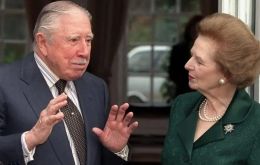
A former commander in chief of the Argentine Army, 2003 to 2011, and Malvinas Veteran, Martín Balza in a recent column in the Buenos Aires daily Perfil, wrote a column exposing what he described as 'a secret pact between Chile and UK', to help avoid the defeat of the British Task Force in 1982 during the Falkland Islands conflict with Argentina.
-
Thursday, February 22nd 2024 - 10:29 UTC
Chilean authorities reopen probe into Neruda's death
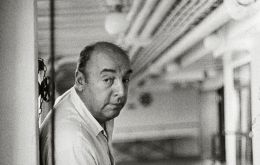
Chilean authorities decided this week to launch an investigation into the Sept. 23, 1973, death of Communist poet Pablo Neruda, winner of the 1971 Literature Nobel Prize, who is believed to have been poisoned by the military regime of dictator Augusto Pinochet (1973-1990) less than a fortnight after seizing power in a bloody coup d'état. At that time, Neruda, 69, was said to be suffering from prostate cancer, but it is believed he was not terminally ill by then.
-
Friday, September 8th 2023 - 10:45 UTC
Chile: Boric and former presidents sign declaration against dictatorship
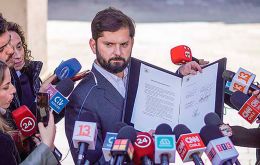
Chilean President Gabriel Boric Font and his four living predecessors Thursday signed a so-called “commitment for democracy” document as the 50th anniversary of the coup d'état that brought General Augusto Pinochet Ugarte to power between 1973 and 1990 looms over.
-
Thursday, September 7th 2023 - 11:19 UTC
“The situation in Chile was chaotic”, ex president Piñera recalls the Chilean coup

Next Monday, September 11th, Chile will remember the fiftieth anniversary of the military coup led by General Augusto Pinochet which overthrew constitutionally elected president Salvador Allende, the first Marxist to reach the highest office in the land. But the coup and half a century, far from healing the wounds that caused it have remained alive in Chile, in a community that can be said has been divided in half.
-
Thursday, August 31st 2023 - 15:13 UTC
Chile launches “Truth and Justice” program to determine forced disappearances under dictator Pinochet
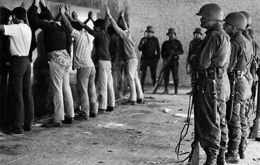
Chile's government launched a program on Wednesday that seeks to determine what happened to more than 1,000 people during Augusto Pinochet's military dictatorship 50 years ago.
-
Wednesday, August 30th 2023 - 08:59 UTC
Chile: One of Víctor Jara's murderers kills himself
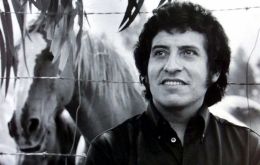
Eighty-six-year-old Retired Chilean Army General Hernán Carlos Chacón Soto committed suicide Tuesday moments before he was to be transferred to the Puntateuco jailhouse to begin serving his 25-year sentence for the 1973 abduction and murder of singer-songwriter Victor Jara and Prisons Bureau Director Littré Quiroga, it was reported in Santiago.
-
Tuesday, August 29th 2023 - 08:38 UTC
Chile: Sentences against Víctor Jara's murderers upheld
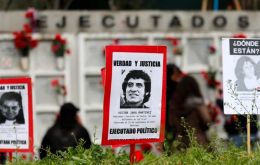
Chile's Supreme Court Monday sentenced seven retired military officers involved in the Sept. 12, 1973, kidnapping and murder of singer-songwriter Víctor Jara to 25 years in jail, it was reported in Santiago. Those convicted are between 73 and 85 years old and are all at liberty.
-
Monday, August 28th 2023 - 10:24 UTC
Chilean top military brass letter to President Boric on the 50th anniversary of the coup

Just a couple of weeks before the commemoration events of the fiftieth anniversary of the Chilean coup d'état (11 September), retired Generals and Admirals addressed a letter to President Gabriel Boric.
